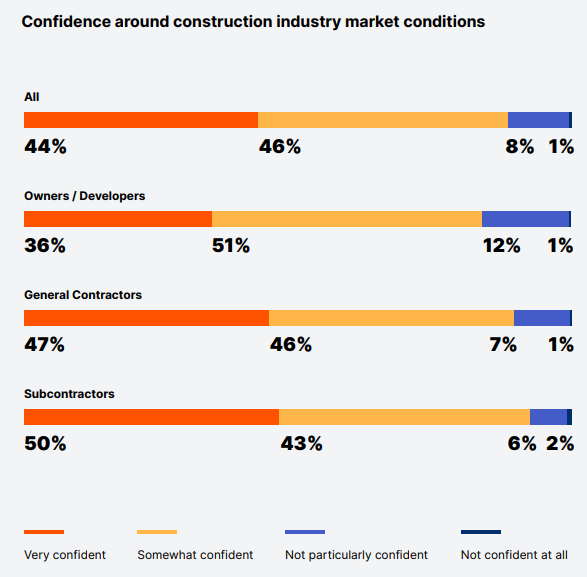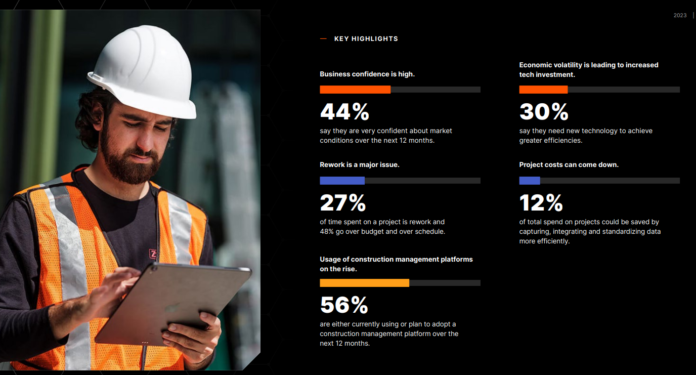By Robin MacLennan
Ontario Construction Report staff writer
Nine out of 10 Canadian construction companies polled for Procore Technologies’ How We Build Now: Technology and industry trends shaping Canadian construction in 2023 report said they are confident about industry conditions over the next 12 months.
“We are encouraged to see the Canadian construction industry’s leaders express optimism as they look to consolidate and build on post-pandemic progress,” said Nolan Frazier, regional sales director for Canada at Procore.
In the residential sector, 43 per cent of respondents said they expect to build more housing units in 2023 compared to 2022, however, more than half from B.C. (51 per cent) and Alberta (55 per cent) expect to build fewer housing units in 2023 compared to 2022 – a stark contrast to Ontario where 60 per cent of respondents expect to build more housing units this year.
Labour shortages and supply chain problems
The report confirmed hiring and retaining skilled labour is the top challenge contractors will face over the next 12 months:
- 9 per cent report they have been unable to take on more projects in the past three to six months due to labour shortage
- 27 per cent agree it is hard for construction to compete with other industries for good employees
- 27 per cent agree there is too much competition in construction for talent
- 32 per cent fear that some of their most experienced people will retire within the next few years and take valuable knowledge with them
Supply chain issues are also impacting the industry, to different degrees depending on location with 41 per cent of respondents from Quebec reporting significant delays compared to 35 per cent of respondents from Ontario and just a quarter of respondents in B.C.
Digital Transformation Critical to Overcoming Roadblocks
Construction firms in Canada understand that digital transformation is required to overcome the labour shortage: 22 per cent of construction businesses consider themselves a digital-first business and 51 per cent are ‘well on the way’ to adopting digital formats and workflows.
The survey showed 27 per cent of the total time spent on a project is spent on rework or rectifying issues. Other findings:
- Almost half of all projects go over budget (50%) and over schedule (49%) according to respondents
- Over 30 per cent of respondents identify needing new technology to improve operational efficiency and cost controls amid economic volatility
- Paper remains a common medium for Canadian construction decision makers. About a quarter of respondents (23-28%, depending on the workflow) still use paper-based records or non-digital processes as part of their workflows
 Respondents report spending 17 per cent of their time on a typical project searching for data or information – clearly too much time on low productivity tasks
Respondents report spending 17 per cent of their time on a typical project searching for data or information – clearly too much time on low productivity tasks
Half said they have a foundation in place to begin learning from their data but don’t necessarily have a dedicated data team in place. One in five say much of their data exists in spreadsheets or on paper and they do not leverage data to drive business outcomes
“We are encouraged to see the Canadian construction industry’s leaders express optimism as they look to consolidate and build on post-pandemic progress,” said Nolan Frazier, regional sales director, Canada, Procore. “In particular, this survey shows half of the respondents see a need to embrace greater collaboration in projects among stakeholders; half of them are also well on their way in their digital transformation journey.
“Some also recognize the opportunity to leverage the massive amounts of data generated through the use of technology to make more data-driven decisions across every phase of the construction life cycle.”
Overall, the industry is “keen to adopt more environmentally conscious and sustainable building practices.” The report concludes, with half of the respondents saying they have started to focus on strategies like prefabrication and improved material selection to reduce the carbon footprint of their projects. Four in 10 are either currently tracking or plan to start tracking (within the next 12 months) carbon emissions on their construction projects.
Also, 38 per cent of construction decision makers said there is a need to improve diversity and inclusion in construction workplaces to attract women, minorities and historically underrepresented groups. Only 41 per cent of respondents have a diversity and inclusion policy in place with another 45 per cent planning to implement one in the next 12 months.

